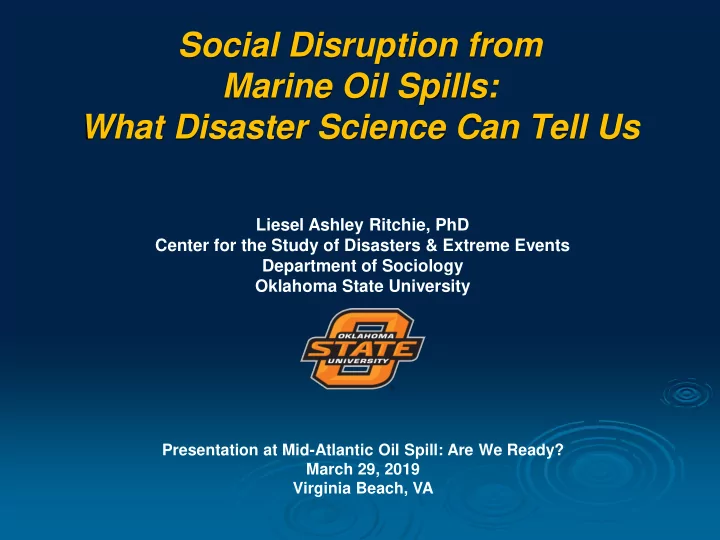

Social Disruption from Marine Oil Spills: What Disaster Science Can Tell Us Liesel Ashley Ritchie, PhD Center for the Study of Disasters & Extreme Events Department of Sociology Oklahoma State University Presentation at Mid-Atlantic Oil Spill: Are We Ready? March 29, 2019 Virginia Beach, VA
Societal Dimensions of Hazards and Disasters What we know about the social impacts of marine oil spills is situated in a longstanding body of research on societal dimensions of hazards and disasters
Disaster Events: Continuum of Deliberateness Events Caused by Purposeful, Human Error or Premeditated Acts Acts of God Recreancy Litigation Terrorism, Mass Natural Technological Disasters Shootings Disasters Ritchie (2004) based on Green (1982, 1996).
Overlapping qualities and characteristics…
Love Canal, New York (1978)
Three Mile Island, Pennsylvania (1979)
TVA Coal Ash Spill, Tennessee (2008)
Elk River, West Virginia (2014)
Kanawha County, West Virginia (2015)
Flint, Michigan (2015…)
Psychosocial stress: The interrelation between social factors and individual thought and behavior.
Key Issues Associated with Technological Disasters Overall, pervasive uncertainty Contested interpretations of the event “Loss of control” Primary responsible parties Response processes are different (e.g., clean-up activities)
Key Issues Associated with Technological Disasters Social vulnerability to environmental hazards Disruption of interpersonal/group relationships — corrosive community Boom and bust cycles — money spill Community ties to the environment Invisible trauma to the natural and social environments
Key Issues Associated with Technological Disasters Secondary trauma from bureaucratic impersonality including claims, settlement, and litigation processes Long-term adverse health outcomes Lack of closure — chronic community impacts “Recovery” becomes elusive
Social Impacts of Marine Oil Spills Empirical research on marine oil spills has documented similar patterns and increased understanding of the effects of toxic environmental contamination on communities
Exxon Valdez Oil Spill, Alaska (1989)
BP Deepwater Horizon Oil Spill, Gulf of Mexico (2010)
Key Findings Comparative studies of the Exxon Valdez and Deepwater Horizon spills revealed similar psychosocial impacts among a sample of residents from Cordova, Alaska and a sample of residents from coastal Alabama Among the strongest predictors of stress: Concerns about family health and economic future - Economic loss - Connections to renewable resources - Exposure to the oil - Involvement with compensation processes -
Compensation Processes Recent research findings regarding involvement with compensation Being a claimant is associated with elevated - levels of stress and avoidance coping behaviors Community members, whether they are - involved in compensation processes or not, also have elevated levels of stress and engage in avoidance behaviors Highlights the chronic nature of technological disasters
Where we are…
A Way Forward Focus on preparedness and awareness — understanding and communicating risk in local and regional contexts Emphasize inclusion of local knowledge Actively seek civic engagement and develop effective, inclusive community processes in prevention, response, and mitigation activities Increase understanding about how specific mitigation, preparedness, response, and compensation processes affect community resilience and long-term recovery prospects
Thank you! liesel.ritchie@okstate.edu
Recommend
More recommend